Free Oklahoma Last Will and Testament Form
A last will and testament is a legally binding document that conveys the testator’s last wish in the form approved by law and ascertains the appropriate distribution of the will creator’s assets upon their passing.
Creating a will is often a prudent decision for just about anyone who would like to avoid disagreements and misunderstandings. A thought-out and appropriately written last will is often essential to all your family members and relatives upon your death, even if you do not have lots of property.
Below, you’ll find an Oklahoma last will and testament form for download and the tips that should solve your possible doubts related to estate planning, kinds of last will, and the way to make a valid document.
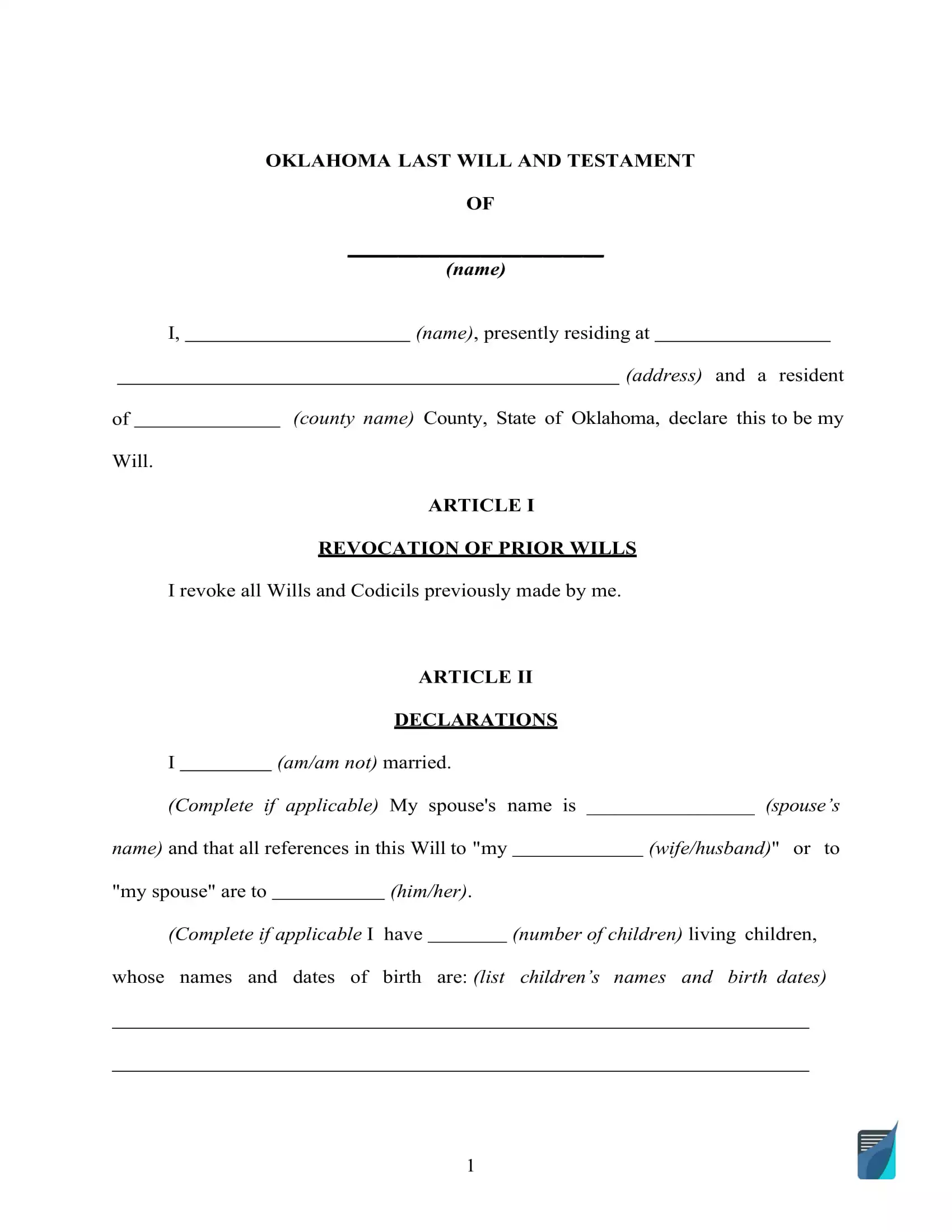
Build Your Document
Answer a few simple questions to make your document in minutes
Save and Print
Save progress and finish on any device, download and print anytime
Sign and Use
Your valid, lawyer-approved document is ready
Oklahoma Last Will Laws and Requirements
| Requirements | State laws | |
| Statutes | Title 84 – Wills and Succession | |
| Signing requirement | Two witnesses | §84-55. Formal requisites in execution – Self-proved wills |
| Age of testator | 18 or older | §84-41. Persons who may make a will – Persons subject to guardianship or conservatorship |
| Age of witnesses | 18 or older | §84-55. Formal requisites in execution – Self-proved wills |
| Self-proving wills | Allowed | |
| Handwritten wills | Recognized if meeting certain conditions | |
| Oral wills | Recognized if meeting certain conditions | §84-46. Nuncupative wills – Requisites |
| Holographic wills | Recognized if meeting certain conditions | §84-54. Holographic wills – Requisites |
| Depositing a will | Possible with the Probate Division of an Oklahoma county district court A fee is county-specific | §84-81. Wills deposited with judge of the district court |
How to Make an Oklahoma Last Will and Testament
1. Think about your possible choices. Decide whether or not you prefer to hire attorneys or create your last will on your own (either by handwriting it or working with a free last will and testament form).
2. Specify your details. Fill out your full name and address (the city, county, and state of residence) to determine the testator of the last will. Review the remaining portion of the section, including the details you’ve written and the “Expenses and Taxes” paragraph.
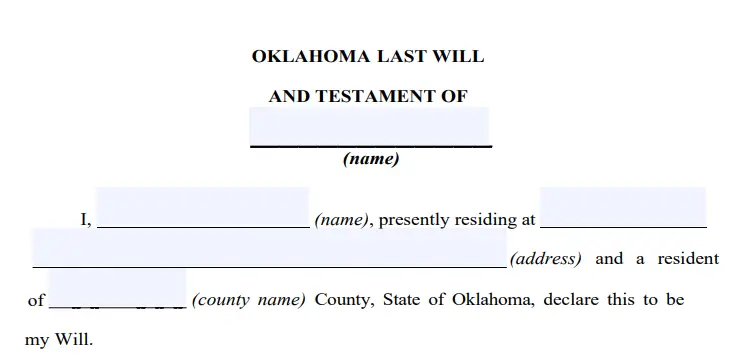
3. Establish the executor. Select the executor of your estate and fill out their details: full name and place of residence, which should usually be in the same state the testator lives mainly because almost all states impose special rules on out-of-state executors. Although it isn’t mandatory, it’s a wise decision to choose one more person to be an executor if the first one is unwilling or incapable of carrying out your will.
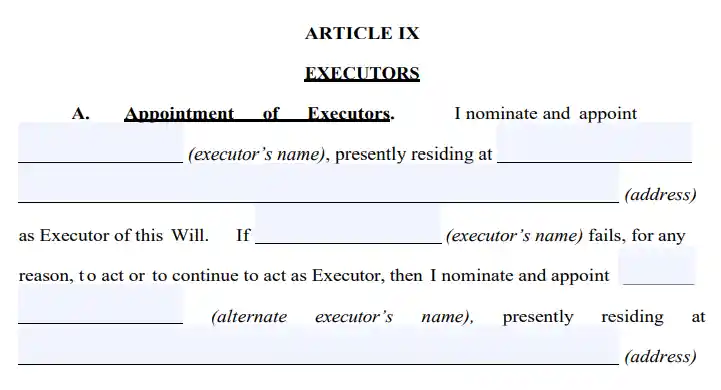
4. Appoint the guardian (optional). You are able to specify a trusted person as a guardian in case you have underage or dependent children that need to be taken care of. If there are no instructions regarding who should look after your kids, the guardian will be assigned by the court.
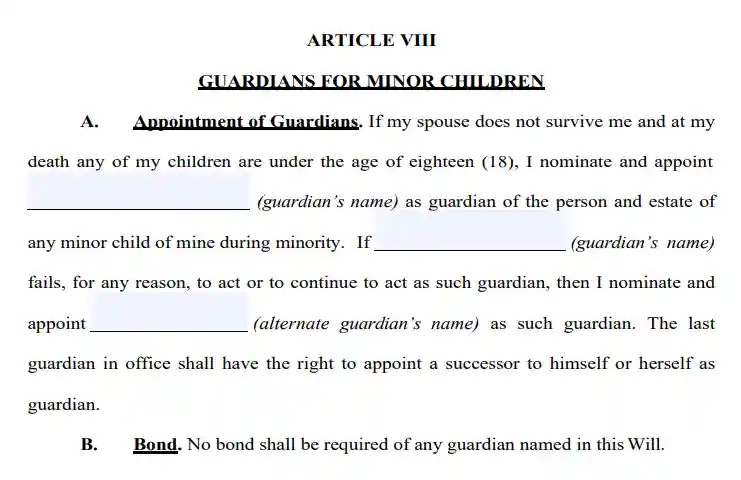
5. Establish your beneficiaries. This is where you specify those who will inherit your property. Fill out their full names, places of residence, and your connection to them (e.g., spouse, child, friend).
6. Distribute possessions. It is possible to define which of the inheritors receives this or that piece of property. If you don’t, the assets are going to be allocated equally amongst the beneficiaries. Money for arrearage, real estate, stocks, business control, cash, and any physical items of commercial worth in your possession can be mentioned in the will. Yet, shared and living will property, as well as your life insurance, can’t go in your last will.
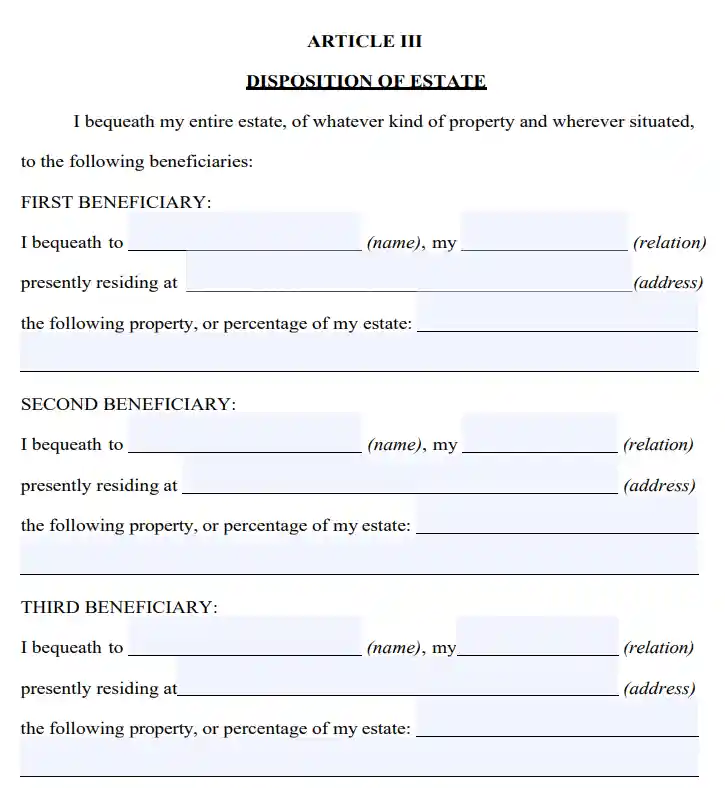
7. Continue with the witnesses putting the signatures at the end of the document. According to Oklahoma legislation, for a last will to be legally correct, it must be signed by two witnesses. They have to be over 18 years of age and have absolutely no interest in your last will, meaning these people cannot be the inheritors. As an extra safeguard against scenarios when your will is contested or some other problems, it’s a wise decision to assign a witness who is younger than you to be sure they will still be there after you depart this life.
After a careful review of each passage in your last will and testament, all parties involved (you and the two witnesses) have to write their full names and addresses and sign the document.
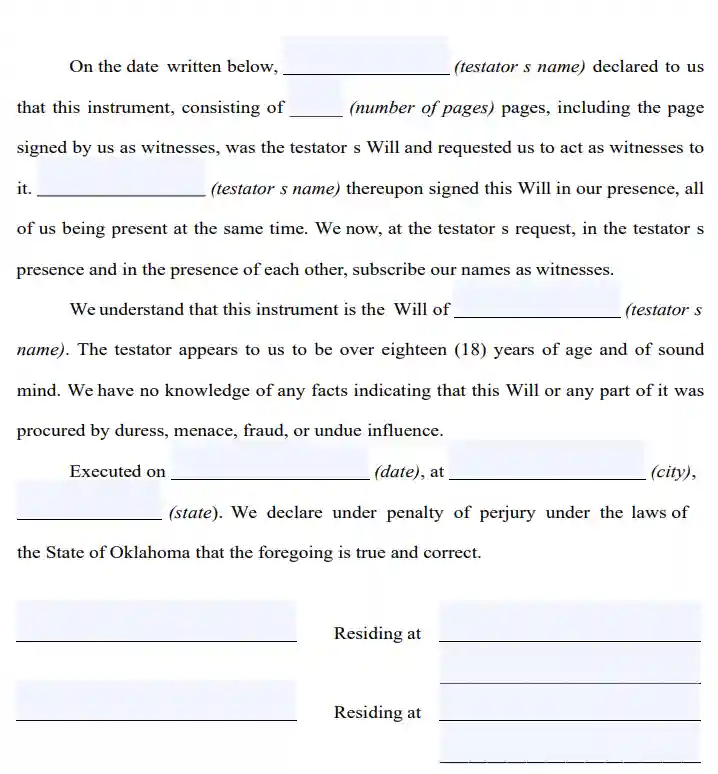
Get a Free Oklahoma Last Will and Testament
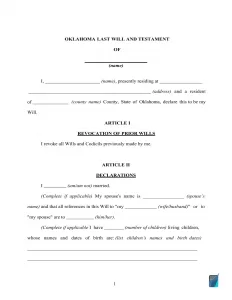

Frequently Asked Questions
What's the primary difference between 'Power of Attorney' and 'Executor'?
A power of attorney is a legal document that assigns a person, often called your agent or proxy (doesn’t need to be a lawyer), to take care of important things for you when you are alive. There are numerous types of power of attorney, the two principal ones being:
- General power of attorney – lets you appoint a proxy (agent) who will have the ability to take care of your financial and legal matters in your stead. But, this document becomes invalid in case the principal passes away or becomes incapacitated.
- Durable power of attorney – grants the identical authority to the proxy as the first type but will stay effective even if the person on behalf of whom the agent acts becomes disabled.
An executor is a person you have confidence in and appoint to ensure the will’s instructions are performed. You could appoint the same individual to act as an attorney-in-fact and will executor.
Must I attest my last will in Oklahoma for it to be valid?
In Oklahoma, there’s no need to notarize your will. Nonetheless, you’ll need a notary public if you wish to make your will self-proving by attaching an affidavit to it. If you make your will self-proving, the court won’t need to speak to the witnesses to determine the legality of the document, which will expedite the probate.
What is better: an attested or holographic last will?
For any holographic last will to become legally binding, you have to handwrite the whole document, indicate the date of writing, and put your signature on it. But, these last wills are typically viewed as a temporary alternative. You’d like to substitute this kind of will by making an attested one when you can use an attorney’s expertise or a fillable template. Holographic wills can include unclear instructions and may miss vital terms, so they are more challenging to enforce and can slow down the probate considerably. Hence, it might be a better choice to go for the second solution we discuss below.
An attested last will is normally typewritten because it’s commonly prepared by a legal professional or is based upon a will template, like the one you can get from us. To be viewed as valid, it has to be signed by the testator and two credible witnesses over the age of 18 in the testator’s presence, which can also be exercised in the presence of a notary. But, the latter isn’t needed in Oklahoma.
What is testamentary capacity?
Testamentary capacity is a term used to describe the testator’s (the person creating the will) legal and mental capability (sound mind) to write and modify their last will and testament.
In the majority of states, to create a last will, you have to be of sound mind and no less than 18 years old. “Sound mind” signifies that you don’t have any kind of mental illnesses (dementia, senility, insanity, etc.) that doesn’t allow you to have an understanding of the aftermaths of your actions.
Is it needed (in Oklahoma) to add a self-proving affidavit to my last will and testament?
Based on Oklahoma law, you do not need to attach a self-proving affidavit to your last will and testament. However, it will serve you well to add this document. In the course of probate, it will act as a substitute for the witness testimony in court and ease the process.
Is it possible to disinherit your child or spouse?
Oklahoma is not a community property state. Also often called marital property, it is a form of interest documentation provided by the law that implies that 1/2 of all properties and assets (along with debts) of one marriage partner is owned by the other and stays such on divorce. In Oklahoma, you are allowed to disinherit your spouse, but note that he/she will be entitled to a determined minimum number of your assets.
Except for your husband or wife, Oklahoma law allows you to disinherit any other members of the family. That refers to your adult children and other family members; simply include disinheritance provisions to the last will and testament.
Is it possible to change my will without my approval?
No, the will can be changed only by you. A third party is only able to sign the will when you are physically unable to do it.
Is it possible to change a typewritten last will and testament after signing it? (in Oklahoma)
Yes, it’s possible.
In accordance with Oklahoma law, you are allowed to alter or revoke your will if you’re not obliged by a legal agreement that mentions the opposite.
It can also be wise to revise your last will in such situations:
- A child has been born or adopted
- You have married or divorced
- Real estate or a large piece of property has been purchased or sold
- Significant changes in your money situation
What happens if I have lost my last will and testament?
In Oklahoma, the law says that the court can accept a will if it’s damaged or lost. However, the probate court is not likely to approve anything except for the original of the last will to probate.
According to Oklahoma law, the will’s absence is assumed as its repeal. That suggests that the trustee will have to provide proof of the will’s validity, which may prove to be quite difficult.
For a holographic last will, you will require sworn witnesses and testimony to show. This makes the process a lot more troublesome. The reason behind not providing the last will and testament and its details has to be demonstrated too.
What does one have to do in case they are not physically able to sign the will?
As per the Oklahoma Estate Code, it’s possible for someone to sign their last will and testament given that it’s your (as a testator) instruction and with you present. The person who wrote the will can state their last wishes in words, by giving a positive answer to an inquiry, or with gesticulation.
It’s possible to have a notary sign the name of a testator who is physically incapable of doing it if the latter instructs the notary public with a witness present. It is important to note that these witnesses are not allowed to have an interest (equitable or legal) in any of the properties and assets that are the concern or may be impacted by this type of a document (the will).
| Related documents | Cases when you may want to have one |
| Codicil | You want to make a single or a few small adjustments to your will. |
| Self-proving affidavit | You wish the probate to be faster when the time comes. |
| Living will | You would like to be sure your end-of-life treatment is carried out according to your wishes. |
| Living trust | You want additional safety and privacy once the time to distribute your property comes. |
Last Will and Testament Forms for Other States
